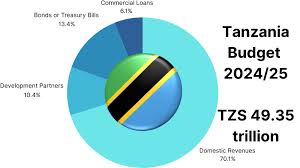The Tanzanian government has unveiled a comprehensive education budget proposal for the 2025/26 financial year, reflecting a strong commitment to advancing education, science, and technology in the country.
The Ministry of Education, Science and Technology has requested a total allocation of TSh 2.439 trillion (approximately USD 1 billion), aiming to address both operational and development needs across its institutions.
Presenting the budget estimates in Dodoma on May 12, 2025, the Minister for Education, Science and Technology, Prof. Adolf Mkenda, told Parliament that the funding will support key programs intended to boost the nation’s academic and technological landscape.
Out of the requested amount, TSh 688.6 billion is earmarked for recurrent expenditure. This includes TSh 635.2 billion for public sector salaries and TSh 53.3 billion for other operational costs. The largest share—over TSh 1.7 trillion—is designated for development projects designed to improve infrastructure, innovation, and training within Tanzania’s education sector.
“This budget is a reflection of our continued investment in our youth and in the long-term prosperity of Tanzania through science, innovation, and knowledge,” Prof. Mkenda said during his address to Parliament.
Also Read; Mexico Sues Google Over Renaming of Gulf of Mexico
The proposed funds will also support a number of flagship initiatives, such as the recently announced Mama Samia 360 – DSP/AI+, a scholarship and capacity-building program targeting top science students. The program will provide A-Level graduates with preparatory training, facilitate their admission to globally ranked universities, and support their continued studies in advanced fields like data science, artificial intelligence, and computer science.
The development portion of the budget will also include ongoing support for students pursuing nuclear science and heavy investment in research projects. According to the ministry, 130 existing research projects will be continued while 155 new ones will be launched in key sectors such as health, education, agriculture, business, and environmental sustainability.
Stakeholders across the academic sector have welcomed the proposed budget, citing it as a necessary step toward achieving Tanzania’s Vision 2025 goals of becoming a middle-income and knowledge-based economy.
The budget proposal will now be reviewed by parliamentary committees before being approved for implementation in the upcoming fiscal year.







